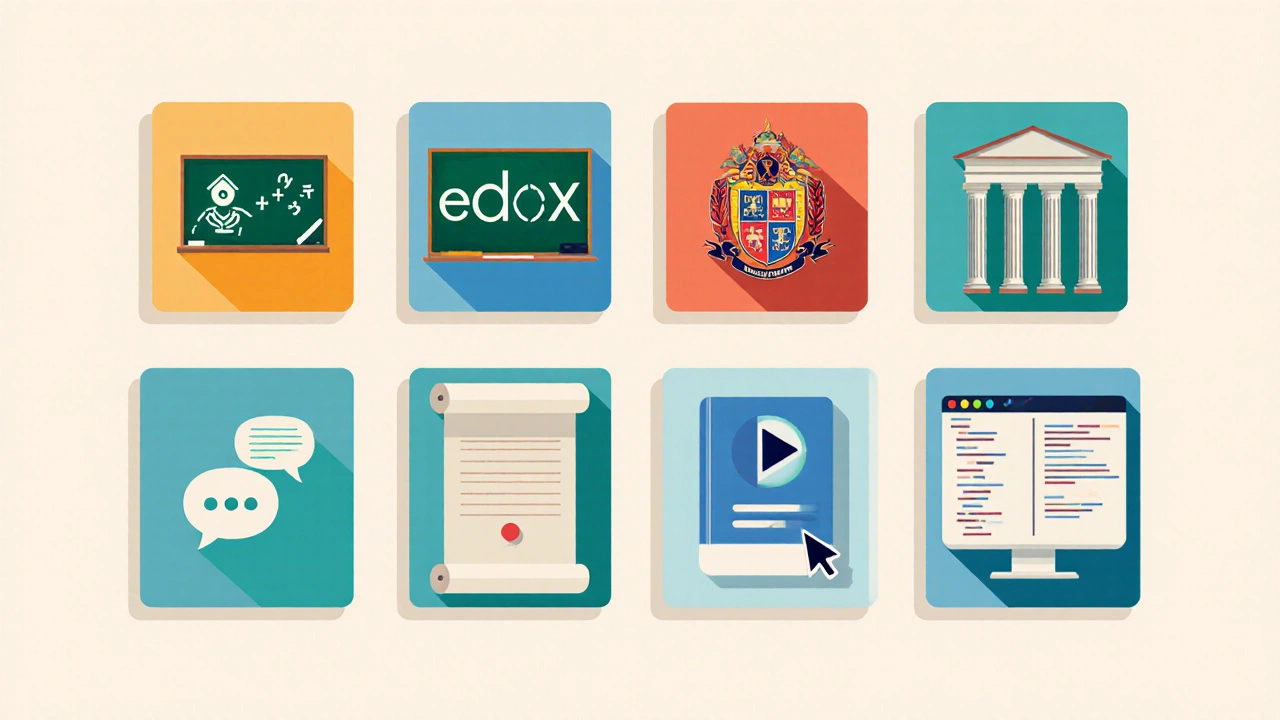Free Learning Platform Selector
Find the perfect free learning platform based on your priorities. Select what matters most to you, then get personalized recommendations.
Trying to find a best free online learning platform can feel like hunting for a needle in a haystack. Hundreds of services promise the moon, but only a handful actually deliver high‑quality courses without charging a penny. Below you’ll get a straight‑forward rundown of the top free platforms, the criteria that matter most, and a quick checklist to help you pick the right fit for your goals.
Key Takeaways
- Khan Academy excels for K‑12 and test prep with an intuitive mobile app.
- Coursera and edX give you university‑level MOOCs and optional paid certificates.
- FutureLearn and Alison are great for short professional skill bursts.
- MIT OpenCourseWare offers raw lecture materials for deep‑dive learners.
- Udemy’s free courses are limited but useful for niche tech topics.
How We Ranked the Platforms
We boiled the decision down to five practical dimensions that matter to most learners:
- Course Variety - breadth of subjects and depth of content.
- Certificate Options - whether you can earn a verifiable credential for free.
- User Experience - UI clarity, mobile support, and offline access.
- Community & Support - discussion forums, mentorship, and peer interaction.
- Credibility - affiliation with universities or recognized industry bodies.
Each platform was scored on a 1‑5 scale for every dimension, then averaged for a final rating.
Top Free Platforms - Quick Profiles
Khan Academy is a nonprofit that offers thousands of video lessons, practice exercises, and mastery‑based pathways for K‑12 subjects, SAT prep, and basic coding. Its mobile app works offline, and the entire catalog is free forever. No certificates, but the learning experience is rock‑solid for anyone building a strong foundation.
Coursera partners with over 200 universities to deliver MOOCs on everything from data science to philosophy. You can audit most courses at zero cost; a paid fee is only required for the official certificate. The platform’s sleek UI, subtitle support, and mobile app make it easy to learn on the go.
edX is a Harvard‑MIT founded MOOC hub offering university‑level courses in engineering, humanities, and business. Like Coursera, you can audit for free and pay for a verified certificate. Its robust peer‑review assignments and discussion boards add a collegiate feel.
FutureLearn is a UK‑based platform owned by The Open University, focusing on short, social‑learning courses. All courses are free for the duration plus 14 days, and you can upgrade for unlimited access and a certificate. The community‑driven comment sections are a highlight.
Alison provides free diploma‑level courses in business, health, and technology. It offers a free “learn‑only” mode and an optional paid certificate. The platform’s modular structure works well for professional development.
MIT OpenCourseWare publishes the full lecture notes, exams, and videos from MIT’s on‑campus classes. No registration, no certificates-just raw academic material for self‑directed learners who want depth without any frills.
Udemy hosts a marketplace of user‑generated courses; a small selection is free. Quality varies, but you can find solid introductions to Python, Excel, and digital marketing without paying. No certificates for free courses.
Codecademy offers interactive coding lessons; the free tier covers HTML, CSS, and basic JavaScript. Its hands‑on editor is ideal for beginners, though more advanced tracks require a Pro subscription.

Side‑by‑Side Comparison
| Platform | Course Variety (1‑5) | Free Certificates? | Mobile/Offline | Community | Credibility |
|---|---|---|---|---|---|
| Khan Academy | 4 | No | iOS/Android apps, download videos | Discussion threads, teacher support | Non‑profit, widely trusted in K‑12 |
| Coursera | 5 | Paid only (free audit) | App with offline mode for paid learners | Course forums, peer reviews | 200+ universities & companies |
| edX | 5 | Paid only (free audit) | App, limited offline for audited courses | Strong discussion boards | Harvard, MIT, global partners |
| FutureLearn | 4 | Free trial period, paid for cert | App, no offline download | Social learning comments | Open University, UK colleges |
| Alison | 4 | Paid for official diploma | App, limited offline | Course forums | Accredited partners worldwide |
| MIT OpenCourseWare | 3 | No | Download PDFs & videos | None (self‑study) | MIT brand |
| Udemy (free tier) | 3 | No | App, offline for purchased only | Q&A per course | Marketplace credibility varies |
| Codecademy (free) | 3 | No | Web app, limited offline | Community forums | Recognized by tech recruiters |
Checklist: Which Free Platform Suits You?
- Need school‑age math or test prep? Go with Khan Academy.
- Want university‑level credits? Auditing Coursera or edX gives you top‑tier content.
- Looking for short, social learning? FutureLearn and Alison keep the community vibe.
- Desire raw lecture notes from a top tech school? MIT OpenCourseWare is unbeatable.
- Just starting to code? Jump into the free tracks on Codecademy or the introductory Udemy courses.
- Need a certificate for free? Most platforms only offer paid certificates; however, you can still showcase completed courses on LinkedIn.

Common Pitfalls and How to Avoid Them
- Assuming “free” means low quality. Stick to platforms backed by universities or reputable nonprofits.
- Skipping the preview. Most sites let you watch a sample video-use it to gauge teaching style before committing.
- Ignoring offline options. If you have limited internet, prioritize Khan Academy or MIT OCW where you can download materials.
- Forgetting community. Engage in discussion threads; they often clarify tricky concepts.
- Overlooking hidden costs. Some “free” courses push you toward paid upgrades; set a strict limit on how much you’ll spend.
Mini FAQ
Are the free courses on Coursera and edX truly free?
Yes, you can audit almost any course at no charge, which gives you access to video lectures, readings, and discussion forums. You only pay if you want a verified certificate or graded assignments.
Can I get a job‑ready skill without paying for a certificate?
Absolutely. Many employers value demonstrable projects over certificates. Build a portfolio with the hands‑on exercises from platforms like Codecademy, Udemy’s free tracks, or Khan Academy’s coding section.
Do these platforms work offline?
Khan Academy’s mobile app lets you download videos for offline study. MIT OpenCourseWare lets you download PDFs and lecture videos from the website. Most other MOOC sites require a paid upgrade for offline access.
Which platform has the strongest community support?
FutureLearn’s social learning model and Coursera’s course forums are among the most active. Khan Academy also offers teacher‑led help for younger learners.
Is there any hidden cost I should watch out for?
Most platforms are transparent, but they may nudge you toward paid features like graded assignments, certificates, or unlimited video downloads. Set a budget and stick to the free tier unless a certificate is essential for your career path.
Next Steps
Pick the platform that matches your learning style, sign up for a free account, and start with a short introductory course. Track your progress for a week, then decide if you need to switch or upgrade. Remember, the best free platform is the one you actually use consistently.

Write a comment